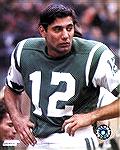01/31/2007
Super Bowl brings past titans to mind
By Don Klein
As television screens all over the country light up this Sunday evening for the playing of the 41st Super Bowl it is almost a certainty that one player will emerge the hero. It happens almost every year and it usually, but not always, is the quarterback.
It remains to be seen whether Indianapolis Colts Peyton Manning or Chicago Bears Rex Grossman comes out better than the other. A look back at past Super Bowls can give everyone clear vision of what it takes to become a football legend.
In 1988 Washington Redskin quarterback Doug Williams threw four touchdown passes in the second quarter including two to wide receiver Ricky Sanders and other scoring passes to wide receiver Gary Clark and tight end Clint Didier. In addition running back Timmy Smith ran for another touchdown in the quarter and added another one in the final frame for good measure. Washington easily won its second Super Bowl championship of the 1980s defeating Denver 42-10.
For his remarkable exhibition of leading the Redskins in this crucial game Williams was elected the most valuable player of Super Bowl XXII. His single quarter heroics of four touchdown passes was a Super Bowl record. He completed 18 of 29 passes for 240 yards and his play helped Washington come back and defeat Denver in the biggest game of the year
Not all heroes of football were quarterbacks. Running backs like Walter Payton became legends on their own. When the Chicago Bears drafted Payton in 1975 the team had been in the doldrums after the retirement of venerated Gale Sayers. But it was not until the last game of that season against the New Orleans Saints that he rushed for a sparkling 134 yards in 20 carries.
But Payton improved. During the 1976 NFL season, he rushed for over 1,000 yards and scored 13 touchdowns. He earned numerous awards that season including the Associated Press and Pro Football Writers of America's Most Valuable Player awards. In 1977 he rushed for over 1,800 yards and scored 16 touchdowns, becoming the National Football League's leading scorer. By the end of the decade, Payton received additional accolades for his exploits as a blocker, receiver, emergency punter, and quarterback.
Despite Payton's success on the field, the Bears struggled to assemble consecutive winning seasons, landing only two playoff berths since his arrival. When Mike Ditka. a legendary tight end, became head coach he immediately propelled the Bears into successful seasons. Payton continued his success by rushing for over 1,400 yards in both seasons. Additionally, on October 7, 1984, Payton broke Jim Brown's career rushing record.
In 1985, Payton rushed for over 1,500 yards, while helping the Bears establish the league's second best offense. In 1985 the Bears were spearheaded by their revolutionary 46 defense as they cruised to a 15-1 record, which culminated with a 46-10 victory over the New England Patriots at Super Bowl XX.
Although Payton's offensive prowess had assisted the Bears throughout the 1985 season, the New England Patriots prevented him from gracing the end zone. In a later interview, Ditka claimed not letting Payton score a touchdown was one of his major regrets. Payton died in 1999.
In 1969 when the Super Bowl was still in its infancy and Joe Namath had not yet earned the name, "Broadway Joe," he made football history and earned a reputation for being one of the most outspoken and talented players in professional sports. Namath's team, the New York Jets, was to play the Baltimore Colts in Super Bowl III when three days before the game, Namath responded to a heckler with the now famous line, "The Jets will win on Sunday, I guarantee it."
The Colts at the time were heralded as the greatest football team in the history of the NFL and Namath's boast made headlines across the nation. Most rejected the comment as just bravado, fans licked their chops and rubbed their palms together as they sat before the TV screens when the game started. Namath would surely get his comeuppance.
In the game, however, Namath backed up his boast and showed that his success during the season was no fluke. He was prepared to take on stiff competition. The Colts vaunted defense was unable to contain the Jets running or passing game, while their ineffective offense gave up four interceptions to the Jets. Namath was the game's MVP, completing eight passes to George Sauer alone, for 133 yards. Namath acquired legendary status for football fans to this day as a symbol brash sporting talent.
The Colts themselves, and Johnny Unitas, their beloved quarterback, became football legends themselves when 11 years before that ill-fated contest with the Jets, they battled the powerful New York Giants in Yankee Stadium in what has been called "The greatest football game in history." It was 1958 and Unitas led the marginally known Colts into New York to face the heavily favored Giants in the NFL championship.
The game was televised and was such a success that it opened the door to lucrative television contracts for professional football. It also led to the eventual establishment of the Super Bowl in 1967. Picking apart the vaunted Giant defense led by massive linebacker Sam Huff, Unitas passed successfully to Raymond Berry and Lenny Moore. When fullback Alan Ameche crashed over the goal line in the last seconds of the game, the Colts had won, 23 to 17.
The following year the two teams met again in the championship game and Unitas again led the Colts to a victory over the Giants, this time the score was 31-16. The Colts became known as the miracle team pulling games out in the last seconds. Unitas made his final appearance in a championship game in the 1971 Super Bowl against the Dallas Cowboys, which the Colts won on a last second field goal, 16-13.
Unitas died in September 2002. They erected a statue of him outside the Baltimore Ravens stadium in downtown Baltimore. Fans rub his foot for luck on the way in to games. Whatever feats Peyton or Rex accomplish this coming weekend, they can only hope they will be remembered some day with as much furor as the sports titans of the past.
Send an Email Letter to Courier Editor - be sure to include your telephone number.
Uploaded: 1/31/2007





